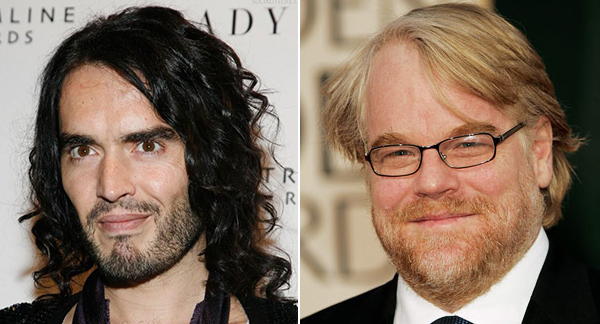If Justin Bieber or Miley Cyrus died from a drug overdose instead of Philip Seymour Hoffman, we wouldn’t be surprised.
At least, that’s what Russell Brand suggested Thursday in a column for The Guardian reflecting on the death of the acclaimed star, following Hoffman’s accidental overdose on Sunday, February 3.
Penning his second public eulogy after writing about late pop star Amy Winehouse in 2011, the comedian and recovering addict observed that one of the biggest shocks of Hoffman’s death was his venerated status as an established Hollywood performer, whose unglamorous private life and respected career stands in stark contrast with the reckless, youthful behavior frequently associated with victims of drug abuse.
“The disease of addiction recognises [sic] none of these distinctions,” Brand said. “… I can assure you that there is no as yet undiscovered riddle in his domestic life or sex life, the man was a drug addict and his death inevitable.”
You might also like: Bill Murray’s Reddit AMA – questions about advertising, recreational marijuana and Garfield
Brand went on to suggest that the solitude of Hoffman’s demise compounded public grief, even if only subconsciously, because it seems unreflective of any sense of fun. “When we reflect on Bieber’s Louis Vuitton embossed, Lamborghini cortege it is easy to equate addiction with indulgence and immorality,” he explained. “The great actor dying alone denies us this required narrative prang.”
Brand, who is recovering from his own addictions to heroin and alcohol, he said that no amount of success or joy overshadows the “echo of an unfillable void.”
“In spite of all the praise and accolades, in spite of all the loving friends and family, there is a predominant voice in the mind of an addict that supersedes all reason,” he said. “And that voice wants you dead.”
You might also like: Breaking Bad-inspired blue meth is becoming a problem in New Mexico
Brand went on to challenge the current drug laws in the UK, which criminalize users and create “the worst imaginable circumstances to maximise the harm caused by substance misuse.”
“People are going to use drugs; no self-respecting drug addict is even remotely deterred by prohibition,” he acknowledged. “What prohibition achieves is an unregulated, criminal-controlled, sprawling, global mob-economy, where drug users, their families and society at large are all exposed to the worst conceivable version of this regrettably unavoidable problem.”
He further questions whether Hoffman might have survived had his addiction not been stigmatized legally, much less socially. “Would Hoffman have died if … we weren’t invited to believe that people who suffer from addiction deserve to suffer?”
“Would he have OD’d if drugs were regulated, controlled and professionally administered?”
“The troubling message behind Philip Seymour Hoffman’s death, which we all feel without articulating, is that it was unnecessary and we know that something could be done,” he concluded. “We also know what that something is and yet, for some traditional, prejudicial, stupid reason we don’t do it.”
Watch Bruce Carlson deconstruct contemporary politics with historical perspectives via My History Can Beat Up Your Politics on FilmOn:
Follow TV Mix on Twitter: @tvmixusa
Contact TV Mix: editors@tvmix.com
SOURCE: TVMix.com

